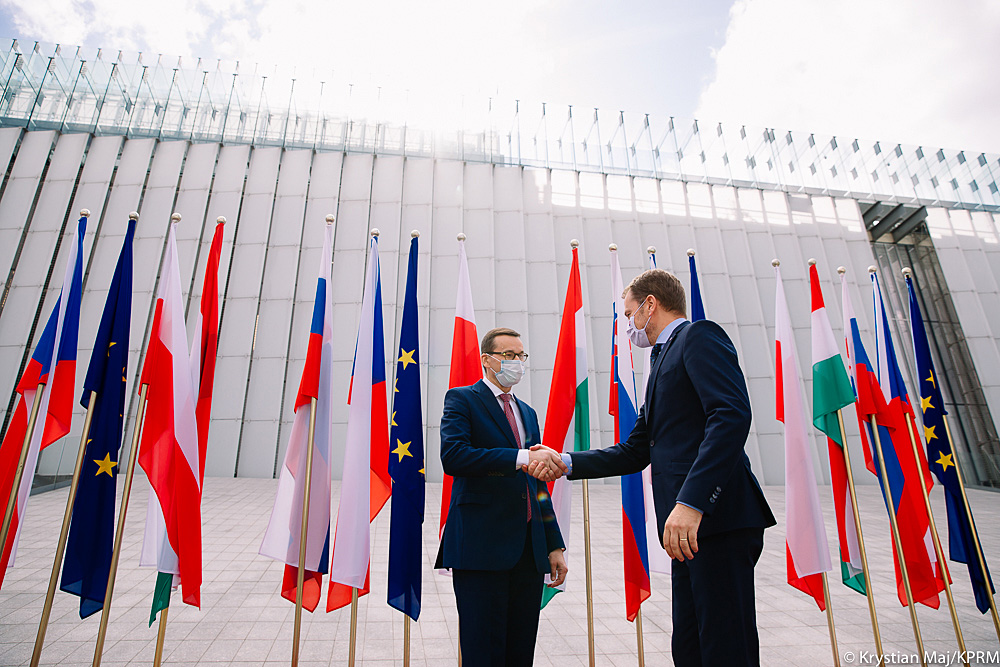Poland’s government will present the EU with a “Marshall Plan” for Belarus that would offer the country economic support if it agreed to void last month’s contested elections and instead hold a free and fair vote.
The plan will be presented on behalf of the Visegrad Group of countries, which includes Hungary, the Czech Republic and Slovakia as well as Poland. It was also discussed today with Polish opposition parties, who have mostly expressed support for the government’s approach.
W #KPRM trwa spotkanie premiera @MorawieckiM z przedstawicielami ugrupowań parlamentarnych w sprawie sytuacji na #Białoruś. pic.twitter.com/RaiKb2D3ut
— Kancelaria Premiera (@PremierRP) September 14, 2020
Later this week, Polish-Lithuanian intergovernmental discussions about the situation in Belarus are also due to take place. It is then hoped that Poland’s prime minister, Matuesz Morawiecki, will present the plan at the next meeting of EU heads of state.
However, the Polish government admits it may face an uphill struggle to gain support. “Unfortunately, not all countries in the EU show as much empathy [regarding Belarus] as Poland, the Baltic states, and the countries of our region,” said Michał Dworczyk, the head of the prime minister’s office, today.
Dworczyk, however, hailed the approach of the domestic opposition, saying that today’s meeting, which lasted over three hours, was “very fruitful”. All political forces in Poland agree on supporting “the sovereignty of Belarus, which consequently gives security and stability for Poland”, Dworczyk added.
But he acknowledged that the one party that had the strongest “divergence of views” from the others is the far-right Confederation (Konfederacja), the smallest of Poland’s parliamentary groups. Its leaders have previously urged a more restrained approach to Belarus.
The Polish government has been active in expressing support for the Belarusian opposition, who are currently protesting President Alexander Lukashenko’s proclaimed re-election last month amid widespread evidence of vote rigging.
Last week, Lukashenko’s opponent in those elections, Sviatlana Tsikhanouskaya, met with Morawiecki in Poland during her first trip abroad since going into exile in Luthuania.
The Polish prime minister promised her support and handed her the keys to a building in Warsaw that can be used by the Belarusian opposition.
As well political support, the Polish government has also pledged economic assistance to Belarus. During her visit last week, Tsikhanouskaya told Morawiecki that she hoped for “moral and financial” backing from Poland. She then attended Poland’s leading annual economic forum, which brings together political and business leaders.
The government has not yet revealed the full details of its “Marshall Plan” – a reference to the post-WWII aid package that the United States provided to Western Europe to help its economic recovery from the conflict.
After last week’s Visegrad meeting in the Polish city of Lublin, Hungary’s prime minister, Viktor Orban, said that discussion of the details would have to wait until the next EU summit, reports Reuters. Morawiecki, however, revealed that one proposal was to offer Belarusians visa-free travel.
At his press conference today, Dworczyk said that the plan sets out a “road map for Belarus relating to the creation of a stabilisation fund and the use of a number of other financial mechanisms”. However, it would only be “offered if elections are repeated and held correctly” in Belarus.
Dworczyk noted that, at last week’s meeting, the other Visegrad countries had authorised Poland to present it to the EU on their behalf.
Visegrad Four to present EU new Belarus support package https://t.co/pijLPrgldY
— Joanna Plucinska (@joannaplucinska) September 11, 2020
The head of the prime minister’s office also reiterated Poland’s position that there can be “absolutely no consent for the Russian Federation to become excessively involved in events in Belarus”.
Not only would “military intervention [be] completely unacceptable”, but so would seeking to “influence the democratic processes”, said Dworczyk.
Russia has itself warned Warsaw to stop “interfering” in Belarus’s domestic affairs. Earlier this month, its foreign ministry accused Poland of being “at the forefront of the EU’s unfriendly policy towards Belarus” and urged the Polish government to “return to the universally accepted norms of international law”.
Lukashenko recently claimed that Poland is seeking to capitalise on the situation in his country by reclaiming former Polish territories from Belarus. No such ambition has been expressed by any mainstream politician or commentator in Poland.
Main image credit: Krystian Maj/KPRM (under CC BY -NC-ND 2.0)

Daniel Tilles is editor-in-chief of Notes from Poland. He has written on Polish affairs for a wide range of publications, including Foreign Policy, POLITICO Europe, EUobserver and Dziennik Gazeta Prawna.




















